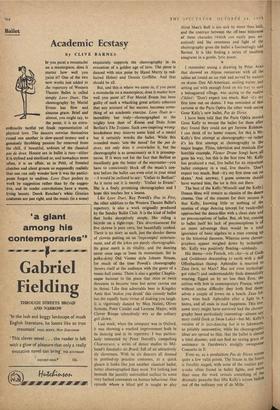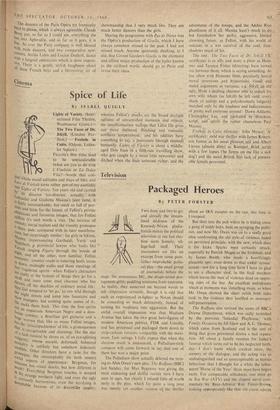Ballet
Academic Ecstasy
Ity CLIVE BARNES
IF you paint a moustache on a masterpiece, does it matter how well you T,.aint it? One of the two new works just added to the repertory of Western Theatre Ballet is called simply Love Duet. The choreography by Meriel Evans has flow and sinuous grace. Brief and almost, you might say, to the point, it is an extra- ordinarily tactful yet frank representation of physical love. The dancers entwine themselves round one another in slow-paced ecstasy and a genuinely throbbing passion far removed from the chill, if beautiful, ardours of the classical pas de deux. Honest sex in ballet is rare--either it is stylised and sterilised or, and nowadays more often, it is an affair, as in Petit, of frenzied clutches and silent groans so supposedly realistic that one can only wonder how it was the partici- pants forgot to undress. Love Duet prefers to work by suggestion rather than by the sugges- tive, and its tender convolutions have a warm, living beauty. Derek Rencher's white Grecian costumes are just right, and the music (in a sense)
exquisitely supports the choreography in its evocation of a golden age of love. The piece is danced with nice poise by Hazel Merry (a red- haired Helen) and Dennis Griffiths. And that should be all.
But, and this is where we came in, it you paint a moustache on a masterpiece, does it matter how well you paint it? For Meriel Evans has been guilty of such a whacking great artistic solecism that any account of her success becomes some- thing of an academic exercise. Love Duet is— incredibly but truly—choreographed to the mighty love duet of fEneas and Dido from Berlioz's The Trojans. Such awe-inspiring wrong- headedness may deserve some kind of a medal but it certainly wrecks the ballet. While this recorded music 'sets the mood' for the pas de deux, not only does it overwhelm it, but the choreography is as unnecessary as it is presump- tuous. If it were not for the fact that Berlioz so manifestly gets the better of the encounter—you have to consciously block off the music's con- text before the ballet can even exist in your mind —1 would be inclined to say: 'Unfair to Berlioz!' As it turns out it is merely: 'Unfair to Evans!' She is a finely promising choreographer and I hope this teaches her a lesson.
Like Love Duet, Ray Powell's One in Five, the other addition to the Western Theatre Ballet's repertory, is also a work originally produced by the Sunday Ballet Club. It is the kind of ballet that looks deceptively simple, like riding a bicycle on a tight-rope. This divertissement for five clowns is pure corn, but beautifully cooked. There is no story as such, just the slender theme of clowns putting on an 'impromptu' entertain- ment, and all the jokes are purely choreographic. Its great merit is its vitality, and the dancing never once sags or loses its momentum. Set to polka-dotty Old Vienna style Johann Strauss, for much of the time Powell's choreography throws itself at the audience with the gusto of a music-hall comic. There is also a gentler Chaplin- esque humour to the piece that once or twice threatens to become twee but never carries out its threat. Like that admirable beer in Kingsley Amis that 'makes you drunk' this comedy ballet has the equally basic virtue of making you laugh. It is vigorously danced by Max Natiez, Oliver Symons, Peter Cazalet and Laverne Mayer, with Clover Roope attractively wry as the solitary girl clown.
Last week, when the company was in Oxford, it was showing a marked improvement both in its dancing and in its repertory. I was particu- larly interested by Peter Darrell's compelling Chiaroscuro, a series of dance studies to Mil- haud's Saudades do Brasil, full of an attractively sly cleverness. With its six dancers all dressed in prettied-up practice costumes, at a quick glance it looks like just another classical ballet, better choreographed than most. Yet lurking just beneath the jauntily untroubled surface lie some very barbed comments on human behaviour. One episode where a blind girl is taught to play Blind Man's Buff is too sick by more than half, and the contrast between the off-beat bitterness of these charades (which can easily pass un- noticed) and the sweetness and light of the choreography gives the ballet a fascinatingly odd flavour. It is like finding a series of insulting anagrams in a gentle. lyric poem.
I remember seeing a drawing by Peter Arno that showed an Alpine restaurant with all the tables set round an ice rink and served by waiters on skates. One All-American. smiling waiter, just setting out with enough food on his tray to save a beleaguered village. was saying to the maitre ehotel: 'Don't expect too much. Bud---it's my first time out on skates.' I was reminded of that cartoon at the Paris Opera the other week seeing Gene Kelly's new ballet, Pas de Theta.
I have been told that the Paris Opera invited Gene Kelly to mount the ballet for them after they found they could not get Jerome Robbins. I can think of no better reason, for this is Mr. Kelly's first attempt at choreography—or rather it's his first attempt at choreography in the major league. Films, television and musicals (for horrible example, Flower Drum Song) have all gone his way, but this is the first time Mr. Kelly has produced a real, live ballet for an important ballet company in a real, live theatre. 'Don't expect too much, Bud—it's my first time out on skates.' And, anyway, 1 guess someone should have warned him, the ice is thin out there.
The best of the Kelly/Minnelli and the Kelly!, Donen films will remain as classics of the dance cinema. One of the reasons for their success is that Kelly, knowing little or nothing of the niceties of stage dancing (except for vaudeville) approached the dance-film with a clean slate and no preconceptions of ballet. But, oh but, coming to ballet itself his lack of preconceptions is of no more advantage than would be a total ignorance of basic algebra to a man coming uP to the binomial theorem. Whereas some choreo- graphers appear weighed down by technique, Mr. Kelly was positively floating—aimlessly.
His theme—tres French, tres chic—is of Gods and Goddesses descending to earth with a dull Offenbachian thump. Aphrodite is married to Zeus (wot, no Mars? Has not even mythology got rules?) and understandably finds domesticity wearing. Egged on by no less than Eros, she arrives with him in contemporary France, where without undue difficulty they both find them- selves a couple of lovers on a beach. Zeus fol- lows, wins back Aphrodite after a fight in 8 bistro, and all ends in mad happiness. This tire- some story might have survived had the choreo- graphy been particularly interesting—almost any story could (look at Swan Lake)—but Mr. Kelly's version of le jazz-dancing hot is so lukewarm, so pitiably uninventive, while his choreographic ideas are spread so thin, that the ballet is almost a total disaster, and can find no saving grace or assistance in Gershwin's stodgily swingsomc Concerto in F.
Even so, as a production Pas de Dicux scores quite a few valid points. The fracas in the bistro is forcibly staged, with none of the routine pat- a-cake often found in ballet fights, and more than once the work reveals something of the dramatic panache that lifts Kelly's screen ballets out of the ordinary run of de Mille. The dancers of the Paris Opera try frantically hard to please, which is always. agreeable. Claude },_3essY put, so far as I could see, everything she has into Aphrodite, and so far as it goes, it is fine• As ever the Paris company is well blessed with. male dancers, and two comparative new- comers. Attilio Labis and Lucien Duthoit, dance with a languid athleticism. which is most impres- sive. There is a gentle, stylish toughness about all these French boys and a throwaway air of showmanship that I very flinch like. They are much better dancers than the girls.
Sharing the programme with eas de Dieux was the Opera's production of Giselle, which I have always somehow missed in the past. I had not missed much. Anyone ignorantly thinking, as I did, that Covent Garden's Giselle is the clumsiest and silliest major production of the ballet known to the civilised world, should go to Paris and revise their ideas.







































 Previous page
Previous page